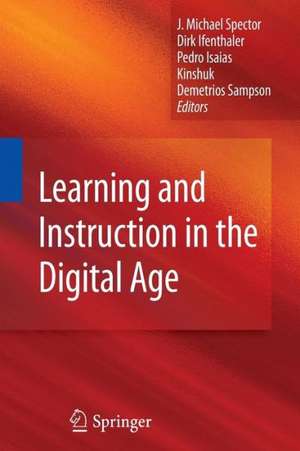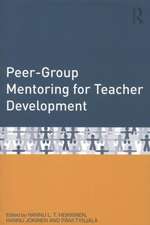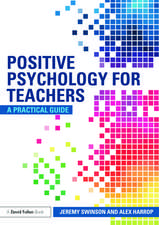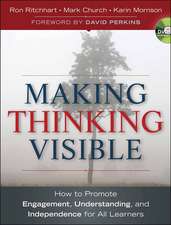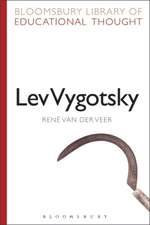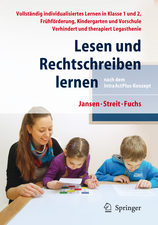Learning and Instruction in the Digital Age
Editat de J. Michael Spector, Dirk Ifenthaler, Kinshuken Limba Engleză Paperback – 27 noi 2014
- Cognition and student-centered, Web-based learning,
- The progression of mental models throughout a course of instruction,
- Experiencing education with 3D virtual worlds,
- Expanding educational boundaries through multi-school collaboration,
- Adapting e-learning to different learning styles,
- The student blog as reflective diary.
| Toate formatele și edițiile | Preț | Express |
|---|---|---|
| Paperback (1) | 950.52 lei 6-8 săpt. | |
| Springer Us – 27 noi 2014 | 950.52 lei 6-8 săpt. | |
| Hardback (1) | 956.69 lei 6-8 săpt. | |
| Springer Us – 18 feb 2010 | 956.69 lei 6-8 săpt. |
Preț: 950.52 lei
Preț vechi: 1159.17 lei
-18% Nou
Puncte Express: 1426
Preț estimativ în valută:
181.90€ • 197.52$ • 152.80£
181.90€ • 197.52$ • 152.80£
Carte tipărită la comandă
Livrare economică 22 aprilie-06 mai
Preluare comenzi: 021 569.72.76
Specificații
ISBN-13: 9781489984616
ISBN-10: 1489984615
Pagini: 420
Ilustrații: XVI, 404 p.
Dimensiuni: 155 x 235 x 22 mm
Greutate: 0.59 kg
Ediția:2010
Editura: Springer Us
Colecția Springer
Locul publicării:New York, NY, United States
ISBN-10: 1489984615
Pagini: 420
Ilustrații: XVI, 404 p.
Dimensiuni: 155 x 235 x 22 mm
Greutate: 0.59 kg
Ediția:2010
Editura: Springer Us
Colecția Springer
Locul publicării:New York, NY, United States
Public țintă
ResearchDescriere
Instruction tailored to the individual student, learning and teaching outside the limits of time and space—ideas that were once considered science fiction are now educational reality, with the prospect of an intelligent Web 3.0 not far distant. Alongside these innovations exists an emerging set of critical-thinking challenges, as Internet users create content and learners (and teachers) take increased responsibility in their work. Learning and Instruction in the Digital Age nimbly balances the technological and pedagogical aspects of these rapid changes, gathering papers from noted researchers on a wealth of topics relating to cognitive approaches to learning and teaching, mental models, online learning, communications, and innovative educational technologies, among them:
- Cognition and student-centered, Web-based learning
- The progression of mental models throughout a course of instruction
- Experiencing education with 3D virtual worlds
- Expanding educational boundaries through multi-school collaboration
- Adapting e-learning to different learning styles
- The student blog as reflective diary
Cuprins
Preface – J. M. Spector, D. Ifenthaler, P. Isaías, Kinshuk, D. Sampson Part I: Cognitive Approaches to Learning and Instruction (Spector) Chapter 1 – Learning and Instruction in the Digital Age: Introduction (Dirk Ifenthaler) Chapter 2 – Cognition and Student-Centered, Web-Based Learning (Michael J. Hannafin & Kathleen Hannafin) Chapter 3 – Testing as Feedback to Inform Teaching (J. C. Powell) Chapter 4 – Enhancing Learning from Informatics Texts (Alexandra Gasparinatou, Grammatiki Tsaganou & Maria Grigoriadou) Part II: Knowledge Representation and Mental Models (Ifenthaler) Chapter 5 – Model-Based Knowledge Mapping (Andreas Lachner & Pablo Pirnay-Dummer) Chapter 6 – Prototype for the Knowledge Representation Supporting Inter-Institutional Knowledge Flow Analysis (Ieva Zeltmate, Mareite Kirikova & Janis Grundspenkis) Chapter 7 – Progression of Mental Models Throughout a Course of Instruction (A. Aubteen Darabi, David W. Nelson, & Norbert M. Seel) Chapter 8 – The Qualitative Study of Contents Analysis and a Construction Method for e-Learning (Naomi Nagata & Toshio Okamoto) Part III: Technology-Facilitated Tools and Techniques (Isaías) Chapter 9 – VideoclipQuests as a New Setup for Learning (Axel M. Blessing & Ulrich Kortenkamp) Chapter 10 – Research on Computer-Supported Collaborative Learning in Trans-Disciplinary Groups (Edita Butrime, Rita Marciulyniene & Rita Valteryte) Chapter 11 – Improving Teacher Performance Using an Enhanced Digital Video Reflection Technique (Geoffrey A. Wright) Chapter 12 – Experiencing and Learning with 3D Virtual Worlds (Laura Benvenuti, Elbert-Jan Hennipman, Evert-Jan R. G. Oppelaar, Gerrit C. van der Veer, BobCruijsberg & Geeske Bakker) Part IV: Communications and Methods (Kinshuk) Chapter 13 – CARTE: An Observation Station to Regulate Activity in a Learning Context (Christope Courtin) Chapter 14 – Acceptance of Model-Based Instruction Among Students in Spanish and Mathematics (Ulrike Hanke & Elke Huber) Chapter 15 – Communities of Learners: Extending the Boundaries of the Learning Experience Through Cross-Institutional Collaboration (Pat Gannon-Leary & Elsa Fontainha) Chapter 16 – Supporting the Implementation of the Case Activities Using e-Learning Technologies (Maria Boubouka, Ilias Verginis & Maria Grigoriadou) Chapter 17 – Practices in Old Age ICT-Education (Minnamari Naumanen & Markku Tukiainen) Part V: Integrative Methods and Online Learning (Sampson) Chapter 18 – Cultural Features of e-Learning: A Euro-Asian Case Study (Fredric William Swierczek & Clemens Bechter) Chapter 19 – Case Study on Student Blogs in a Blended Learning Course (Michael Derntl & Thomas Mazzurana) Chapter 20 – Self-Assessment: A Crucial Process in e-Training (Paola Nicolini, Tamara Lapucci & Chiara Moroni) Chapter 21 – A Design Framework for an Online English Writing Course (ChanMin Kim, Anne Mendenhall & Tristan E. Johnson) Chapter 22 – Catering for Different Learning styles in e-Learning (Vatcharaporn Esichaikul & Clemens Bechter) Chaper 23 – Learning and Instruction in the Digital Age: Epilogue – J. Michael Spector
Textul de pe ultima copertă
Instruction tailored to the individual student, learning and teaching outside the limits of time and space—ideas that were once considered science fiction are now educational reality, with the prospect of an intelligent Web 3.0 not far distant. Alongside these innovations exists an emerging set of critical-thinking challenges, as Internet users create content and learners (and teachers) take increased responsibility in their work. Learning and Instruction in the Digital Age nimbly balances the technological and pedagogical aspects of these rapid changes, gathering papers from noted researchers on a wealth of topics relating to cognitive approaches to learning and teaching, mental models, online learning, communications, and innovative educational technologies, among them:
- Cognition and student-centered, Web-based learning
- The progression of mental models throughout a course of instruction
- Experiencing education with 3D virtual worlds
- Expanding educational boundaries through multi-school collaboration
- Adapting e-learning to different learning styles
- The student blog as reflective diary
Caracteristici
Represents the very latest work in the field where ICT, learning psychology, and instructional design intersect
Expands on established interest of libraries and scholars
Genuine multi-disciplinary approach to the field, with contributions from leading scholars
Includes supplementary material: sn.pub/extras
Expands on established interest of libraries and scholars
Genuine multi-disciplinary approach to the field, with contributions from leading scholars
Includes supplementary material: sn.pub/extras
